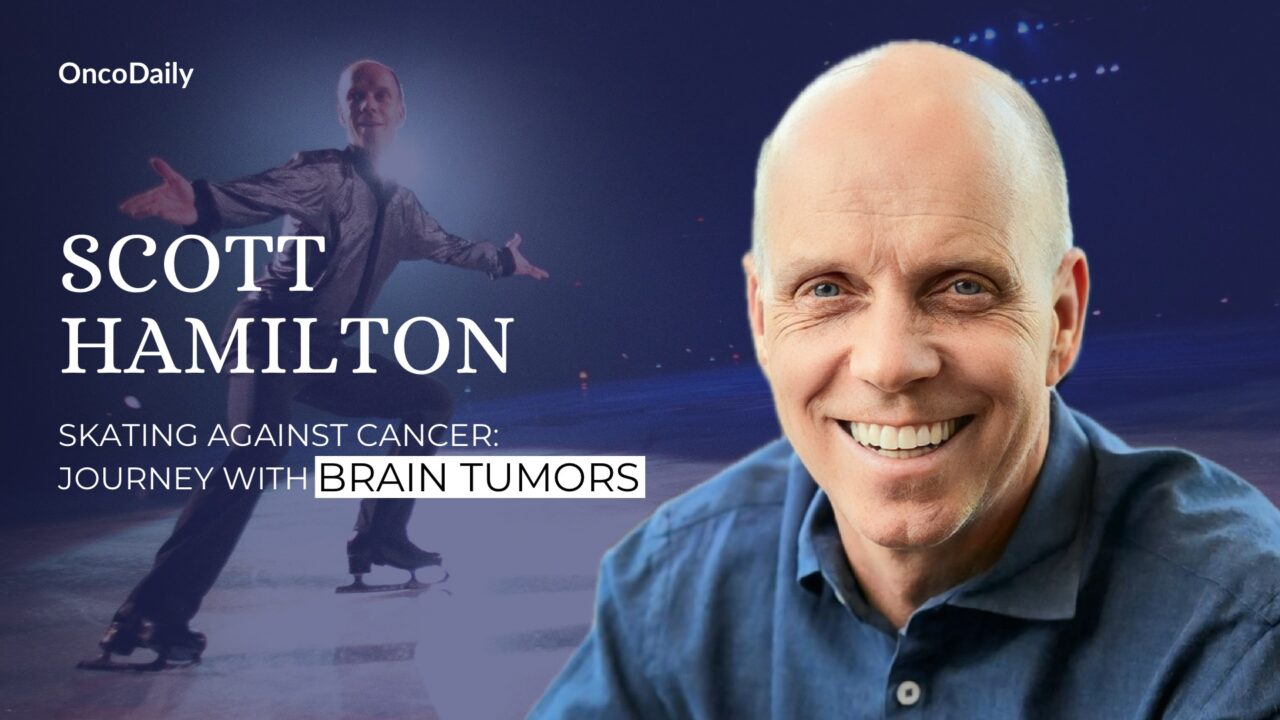Scott Hamilton, the celebrated American figure skater known for winning the 1984 Olympic gold medal and four consecutive World Championships, has become a powerful advocate for cancer awareness following his battles with testicular cancer and recurrent pituitary brain tumors. Diagnosed with testicular cancer and three separate pituitary tumors, Hamilton’s journey highlights the importance of early detection and resilience. Through his Scott Hamilton CARES Foundation, he passionately supports cancer patients and promotes awareness, inspiring others with his message that courage and community can help overcome even the toughest challenges.

How Did Scott Hamilton Get Diagnosed with a Brain Tumor?
Scott Hamilton’s journey with brain tumors began with his first diagnosis in 1997, when he discovered he had a tumor he was born with. This initial diagnosis followed his successful battle with testicular cancer. After surgery and chemotherapy, he faced three benign pituitary tumors in 2004, 2010, and 2016. His experiences were shared during an appearance on The Jennifer Hudson Show on April 18, 2023, where he emphasized how these health challenges ignited his faith and resilience.
Symptoms
Before Scott Hamilton’s diagnosis of a brain tumor, he experienced several critical symptoms that prompted medical attention. These included:
- Headaches: Hamilton reported persistent and increasingly severe headaches, common indicators of brain tumors. These headaches can arise from increased intracranial pressure due to tumor growth, often worsening over time and potentially leading to nausea.
- Cognitive Changes: He experienced issues with cognitive function, including memory problems and personality changes. These symptoms are significant as they can indicate localized brain issues related to tumor activity.
What Were Scott Hamilton’s Initial Reactions to His Diagnosis?
Scott Hamilton’s emotional reaction to his brain tumor diagnosis has been profound and layered, reflecting both fear and resilience. Upon learning about his condition, Hamilton expressed initial shock and fear, particularly recalling the struggles of his mother with cancer. He stated, “Hearing that it was either benign, malignant or something else was unbelievable… I immediately became shrouded in fear” 4. However, this fear was short-lived as he quickly shifted his mindset to focus on the battle ahead.In sharing the news with his wife, Tracie, Hamilton described a powerful moment:
“When I told my wife, Tracie, the first thing she did was take my hand, and we prayed. It was both powerful and empowering. I felt peace and knew we’d be okay”
This moment of prayer underscored the importance of faith in his journey.
What was the Prognosis?
Scott Hamilton’s cancer prognosis is connected to both his battles with testicular cancer and pituitary brain cancer. According to Chen et al study published in Frointers, 2021, pituitary tumors generally have a good prognosis with a 5-year survival rate of 97%, but in cases of relapsed or recurrent tumors, the outcomes are less favorable, with recurrence rates of 40-50% at 5-10 years post-surgery and progression-free survival dropping to 59.3% at 5 years for large or giant adenoma. Early stage testicular cancer has an excellent prognosis, with a 5-year relative survival rate of 99% for localized disease that is confined to the testicle, making it one of the most curable forms of cancer when detected and treated promptly.
The American Cancer Society states that early detection significantly improves treatment outcomes, and Hamilton’s proactive health management reflects this principle. Statistics show that approximately 23,000 people in the U.S. are diagnosed with primary brain tumors annually, with about 70% of these being benign (American Brain Tumor Association). Hamilton’s journey emphasizes the importance of early detection and intervention, illustrating how timely medical care can lead to successful outcomes.
What Treatments Did Scott Hamilton Undergo?
Hamilton’s approach has emphasized a blend of conventional and holistic treatments, alongside a strong focus on faith and mental well-being. He expressed that maintaining a positive attitude and engaging in physical fitness were crucial elements in managing his health challenges, stating,
“Whatever I was doing – getting fit, praying, keeping a positive attitude – it all worked”
His experiences reflect not only the medical interventions he has undergone but also the emotional and spiritual dimensions of dealing with serious health issues.
Surgery and Radiation
- First Brain Tumor (2004): After being diagnosed with a benign pituitary tumor, Hamilton underwent gamma knife radiation, which effectively targeted the tumor. This treatment caused damage to his pituitary gland, leading to hormonal issues that were managed with steroids.
- Second Brain Tumor (2010): Hamilton faced another tumor, which required transsphenoidal surgery to remove it. This surgery came with complications, including an aneurysm due to a nicked ophthalmic artery during the procedure.
- Third Brain Tumor (2016): When faced with a recurrence, Hamilton initially chose to forego traditional treatment unless symptoms became severe. He stated, “I’m not going to worry about this one unless I become symptomatic”. Instead, he focused on strengthening his body and exploring holistic approaches.
- Targeted Radiation Therapy: He mentioned the potential of targeted radiation therapy as a future option to shrink the tumor, indicating a willingness to adapt his treatment as needed
How Did Scott Hamilton Overcome Brain Cancer?
Scott Hamilton demonstrated remarkable mental and emotional resilience during his battles with brain tumors and testicular cancer. He maintained a positive attitude by focusing on gratitude and relying on his supportive family for encouragement. Engaging in regular exercise and embracing a healthy lifestyle helped him stay strong both mentally and physically. Hamilton’s journey showcases how hope and a strong support system can inspire and empower individuals facing cancer, highlighting the power of resilience in overcoming adversity.
Support from Family and Friends
Scott Hamilton’s journey through multiple health challenges, including brain tumors, has been profoundly supported by his family and friends, who played critical roles in his emotional and physical recovery. His wife, Tracie, has been a pillar of strength for him.Hamilton’s relationship with his children has also been significant. He expressed that they motivate him to stay positive and focused on life, stating.
“I choose to truly—in everything that we do—celebrate life.”
This mindset reflects how his family’s presence encourages him to embrace each day fully. In addition to emotional backing, Hamilton’s family has contributed to his physical well-being. He emphasized the importance of getting strong after his diagnosis, saying.
“I’m going to go home and get as strong as I’m going to get.”
This decision highlights the collective effort of his family in supporting his health goals, whether through encouraging fitness or maintaining a healthy lifestyle. Hamilton’s support network extends beyond family. He has shared stories of how friends and fans have rallied around him during his health crises. For instance, he recalled meeting a fan battling a brain tumor himself and sending an encouraging video message: “If we have the opportunity to be light, let’s be light.”

Mental and Emotional Challenges
Scott Hamilton faced significant emotional challenges during his health journey, particularly fear, stress, and uncertainty related to his brain tumors and cancer diagnoses. The initial shock of his first diagnosis was profound; he recalled it as one of the hardest moments of his life, especially when informing his wife, Tracie. This fear was compounded by worries about losing his abilities and becoming a burden.
To overcome these struggles, Hamilton leaned heavily on his faith, stating that his health challenges “ignited my faith.” This spiritual grounding helped him shift from fear to gratitude, as he embraced life fully with the mindset:
“I don’t want people to worry about me at all; I’m playing with house money now.”
In summary, Hamilton’s journey illustrates how emotional support from family, faith, proactive health management, and a positive outlook can significantly aid in coping with life’s challenges.
How Did Advocacy and Public Awareness Help?
Following his cancer diagnoses, Scott Hamilton became a passionate advocate for cancer awareness and early detection. His personal experiences with cancer, including the loss of his mother to the disease, drive his commitment to education and support programs. Hamilton emphasizes the importance of early detection and encourages others to engage with the cancer community, transforming his platform as an Olympic champion into a voice for change in cancer care.
Public Speaking and Advocacy
Scott Hamilton has actively shared his cancer experience and advocated for early detection and cancer research funding through various public speaking engagements and events. Notably, he participated in a fundraiser for the Scott Hamilton CARES Foundation, which focuses on cancer research, during a reunion with fellow Olympic skaters in February 2024. This event highlighted his commitment to raising awareness about cancer, particularly given his personal history with the disease, including multiple brain tumors and testicular cancer.
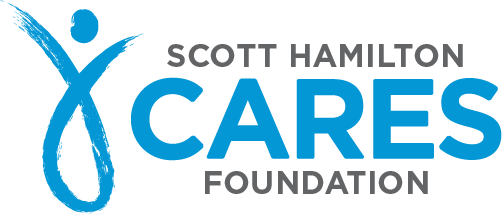
In addition to fundraising events, Hamilton speaks frequently at conferences and organizations, addressing audiences about overcoming adversity and the importance of health awareness. He has delivered inspiring talks at venues such as the M.D. Anderson Cancer Center and James Cancer Hospital, emphasizing the significance of early detection in improving patient outcomes. His engagements often include sharing personal anecdotes that resonate with those facing similar challenges.
Collaborations with Health Organizations
Established in 2014, this foundation focuses on funding cancer research and improving patient care, particularly through initiatives like Chemocare.com and the 4th Angel Mentoring Program, which provides support to patients by connecting them with survivors who have shared similar experiences.
Hamilton’s advocacy extends to public campaigns such as Sk8 to Elimin8 Cancer, which raises funds for cancer research and awareness. He actively participates in events like An Evening with Scott Hamilton & Friends, where proceeds directly support cancer initiatives. His commitment to promoting early detection and innovative treatments, including immunotherapy and targeted therapies, has been evident throughout his career.
Hamilton recognized the potential of these treatments years before they gained wider acceptance, demonstrating his proactive approach to cancer advocacy.
Additionally, he collaborates with organizations such as the Cleveland Clinic Taussig Center and serves on boards for institutions like Monroe Carrell Jr. Children’s Hospital at Vanderbilt. Through these partnerships, Hamilton aims to enhance the quality of cancer care and ensure that patients have access to vital information and resources.
What Is Scott Hamilton’s Life Like After Cancer?
Scott Hamilton has adjusted to life post-treatment with resilience, actively engaging in figure skating and public speaking. Despite ongoing health challenges from his previous diagnoses, Hamilton maintains a positive outlook, stating, “I don’t want people to worry about me at all; I’m playing with house money now.” His commitment to celebrating life and inspiring others remains central to his post-treatment journey.
Continued Advocacy Work
In November 2022, Hamilton hosted the Scott Hamilton & Friends Nashville Ice Show, bringing together top skaters and musicians to raise money for his foundation, emphasizing the power of skating to inspire and heal. This annual event has become a cornerstone of his advocacy efforts, highlighting the importance of community involvement in combating cancer.
Hamilton’s commitment extends to public speaking engagements, where he shares his personal experiences with cancer and emphasizes the need for research funding. He has spoken at numerous healthcare organizations, including the M.D. Anderson Cancer Center and James Cancer Hospital, inspiring audiences with his message of resilience and hope.
Ongoing Health Challenges
Scott Hamilton experiences several long-term health effects as a result of his cancer treatments, particularly from his multiple brain tumor surgeries and radiation therapy. He has faced complications such as hormonal imbalances due to damage to his pituitary gland, which affects various bodily functions. Despite these challenges, Hamilton manages his health today by adopting a holistic approach that includes both Western and alternative medicine practices. He emphasizes the importance of physical fitness, maintaining a healthy diet, and spiritual well-being, stating that he focuses on “getting strong” both physically and emotionally.
What Causes Brain Tumors?
Brain tumors can result from a combination of genetic and environmental factors. Genetic predispositions, such as inherited syndromes like neurofibromatosis and family history, increase risk. Environmental factors include exposure to ionizing radiation, certain chemicals (e.g., pesticides), and occupational hazards in industries with carcinogens. While lifestyle factors are under investigation, the evidence remains inconclusive. Ongoing research seeks to clarify these complex interactions, highlighting the importance of awareness and understanding of risk factors for prevention and early detection.
Genetic and Environmental Factors
- Inherited Syndromes: Conditions like neurofibromatosis and Li-Fraumeni syndrome are linked to a higher risk. Mutations in genes such as NF1 can increase the likelihood of gliomas ( American Brain Tumor Association).
- Family History: Studies show that individuals with a family history of brain tumors have an elevated risk, as highlighted in research published in the Journal of Neuro-Oncology.
- Ionizing Radiation: Exposure to radiation, particularly from previous cancer treatments, is a well-established risk factor. A study in the Journal of the National Cancer Institute showed a clear link between radiation exposure and the development of meningiomas and gliomas.Chemical Exposures: Prolonged exposure to pesticides, such as organophosphates, is associated with increased glioma risk, as noted in Environmental Health Perspectives. Occupational exposure to solvents has also been linked to brain tumors.
- Heavy Metals: Exposure to heavy metals, including lead and mercury, may elevate brain tumor risk, with studies indicating associations in certain occupational groups.
- Lifestyle Factors
Diets high in processed foods, sugars, and unhealthy fats may contribute to overall cancer risk. Conversely, a diet rich in fruits, vegetables, and whole grains supports overall health and may help reduce inflammation and oxidative stress ( World Cancer Research Fund).
Regular physical activity is linked to a lower risk of various cancers, including brain tumors. Sedentary lifestyles can lead to obesity, which is associated with increased cancer risk ( American Cancer Society).
Tobacco use is a known risk factor for many cancers, and while its direct link to brain tumors is less clear, avoiding smoking can improve overall health ( National Cancer Institute). Excessive alcohol consumption may also increase cancer risk (Source: American Institute for Cancer Research).
Chronic stress and poor mental health can negatively affect the immune system, potentially impacting cancer development. Managing stress through healthy coping mechanisms is important for overall well-being (National Institutes of Health).
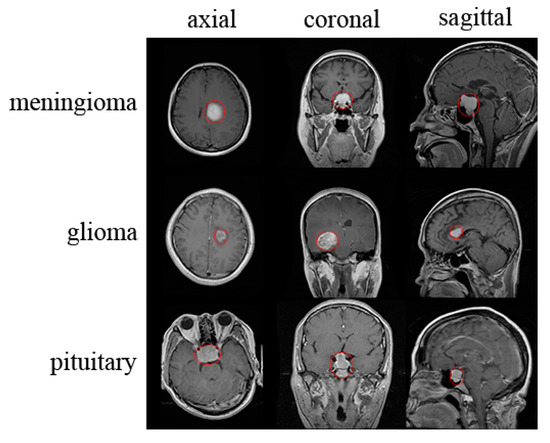
Can Brain Tumors Be Prevented?
Preventive measures for brain tumors include regular check-ups, lifestyle changes, and reducing environmental risks. Medical experts recommend routine screenings, a diet rich in fruits and vegetables, and at least 150 minutes of exercise weekly. Avoiding tobacco and limiting alcohol intake are also essential. Additionally, minimizing exposure to harmful chemicals and unnecessary radiation can further reduce risk. These strategies promote overall health and may lower the likelihood of developing brain tumors.
Regular screenings and early detection are critical in improving outcomes for individuals with brain tumors. Early diagnosis can lead to timely interventions, which significantly enhance survival rates and quality of life.
Importance of Early Detection
- Survival Rates: According to the American Brain Tumor Association, patients diagnosed with brain tumors at an early stage generally have better prognosis. For example, the five-year survival rate for low-grade gliomas can exceed 80% when detected early, compared to lower rates for advanced tumors.
- Symptom Recognition: Early detection allows for the identification of symptoms such as persistent headaches, seizures, or neurological changes. Prompt medical evaluation can lead to early imaging studies, like MRIs, which are crucial for diagnosis.
- Treatment Options: Early detection often provides a wider range of treatment options, including surgical removal, radiation, and chemotherapy, which can be more effective when the tumor is smaller and less invasive.
Lifestyle Changes
Maintaining a healthy diet is essential for overall well-being. Eating a variety of fruits and vegetables rich in antioxidants supports brain health and may reduce oxidative stress linked to tumor development, according to the Harvard T.H. Chan School of Public Health. Limiting processed foods can help reduce inflammation and cancer risk, as noted by the World Health Organization. Choosing whole grains contributes to lower cancer risk due to their fiber content, per the American Institute for Cancer Research, while healthy fats like omega-3 fatty acids found in fish and nuts may offer protective effects against cancer, according to the National Institutes of Health.
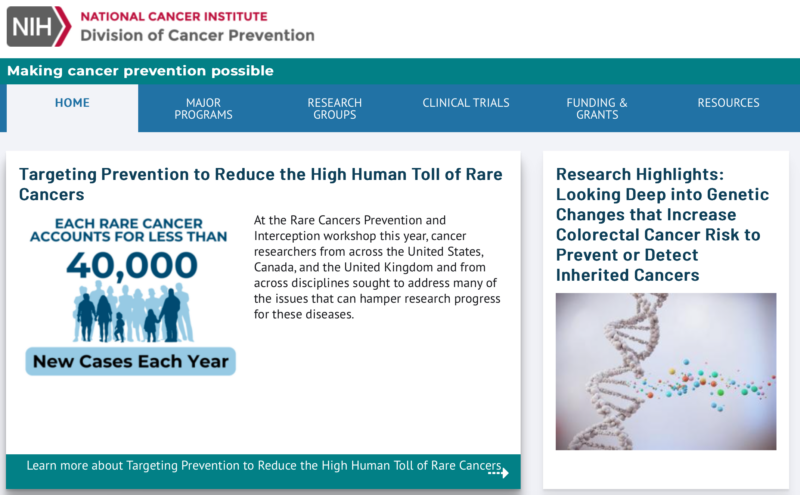
You can read more about NIH cancer prevention policy on official website
To avoid harmful chemicals, choose organic produce to limit pesticide exposure (Environmental Protection Agency) and use natural cleaning products to minimize household chemicals (National Institute of Environmental Health Sciences). Opting for personal care products free from harmful chemicals can also reduce overall exposure (Campaign for Safe Cosmetics).
Staying physically active is crucial; regular exercise is linked to lower cancer risk and better health, as recommended by the American Cancer Society. Quitting smoking is vital since it’s linked to many cancers (National Cancer Institute), and moderating alcohol consumption can further reduce risk (American Institute for Cancer Research).
Finally, managing stress through techniques like yoga and meditation is beneficial (Mayo Clinic), and maintaining a strong support network is important for mental well-being (American Psychological Association).
Scott Hamilton, the 1984 Olympic figure skating gold medalist, has faced multiple health challenges but shared positive updates into 2026. His latest known status from early 2026 reports stable management of a recurrent benign pituitary brain tumor (third diagnosis in 2016), which shrank without new surgery or chemo; he opted for monitoring unless symptomatic.
Read more about other celebrities who also had Brain Cancer, like Dikembe Mutombo: Article by OncoDaily
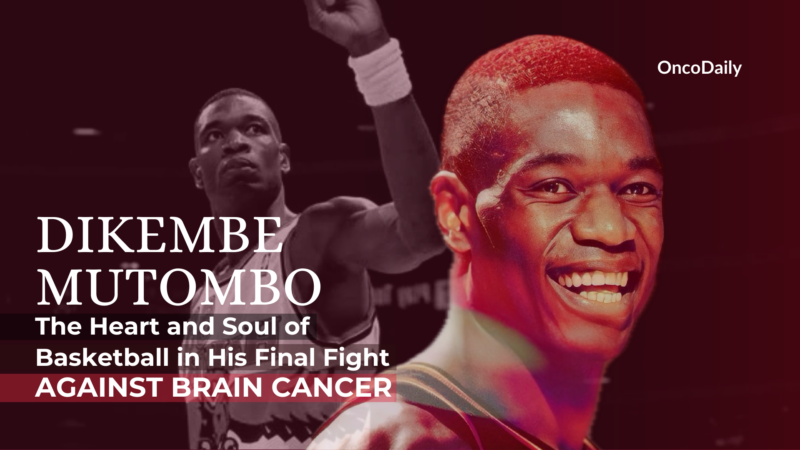
Written by Aharon Tsaturyan, MD
FAQ
What is Scott Hamilton known for?
Scott Hamilton is known as an Olympic gold medalist in figure skating, a television commentator, and a cancer survivor.
When did Scott Hamilton win his Olympic gold medal?
Hamilton won his Olympic gold medal at the 1984 Winter Olympics in Sarajevo.
What types of cancer has Scott Hamilton battled?
Scott Hamilton has battled testicular cancer, diagnosed in 1997, and has faced three brain tumors diagnosed in 2004, 2010, and 2016.
How has Hamilton's faith influenced his cancer journey?
Hamilton has stated that his first brain tumor diagnosis "ignited my faith," providing him with strength and resilience throughout his health struggles.
What is the Scott Hamilton CARES Foundation?
Founded in 2014, the Scott Hamilton CARES Foundation focuses on funding innovative cancer research and promoting early detection to improve patient outcomes.
What treatments has Hamilton undergone for his tumors?
He has undergone surgery and radiation therapy for his tumors but chose to delay treatment for his most recent tumor unless symptoms arose.
How does Hamilton manage his health today?
Hamilton emphasizes a holistic approach to health, focusing on physical fitness, mental well-being, and spiritual strength while remaining open to treatment options as necessary.
What public events does Hamilton participate in to raise awareness?
He hosts events like the "Sk8 to Elimin8 Cancer" series and the annual Scott Hamilton & Friends Nashville Ice Show, which raises funds for cancer research and awareness.
What long-term effects does Hamilton experience from his treatments?
He faces hormonal imbalances due to damage to his pituitary gland from radiation therapy but manages these issues with a healthy lifestyle.
How does Hamilton maintain a positive outlook despite his health challenges?
He focuses on living in the moment and celebrates life, stating, "I don’t want people to worry about me at all; I’m playing with house money now."


